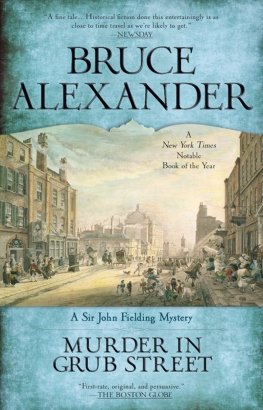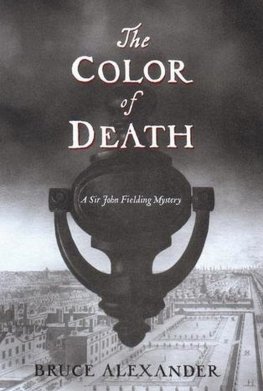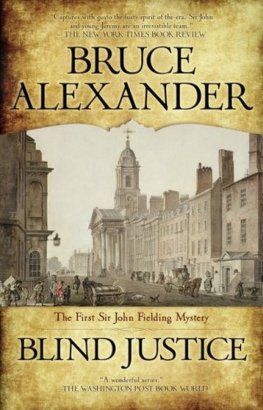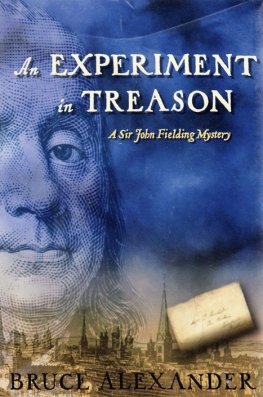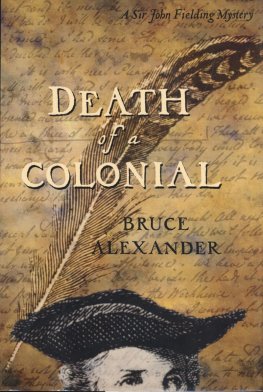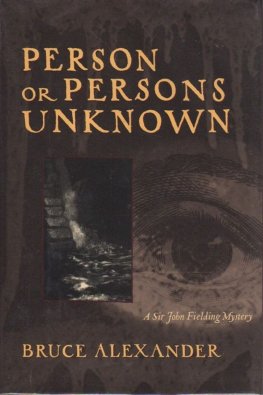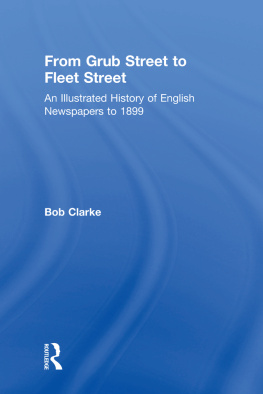Bruce Alexander - Murder in Grub Street
Here you can read online Bruce Alexander - Murder in Grub Street full text of the book (entire story) in english for free. Download pdf and epub, get meaning, cover and reviews about this ebook. year: 1995, publisher: New York : Putnam, genre: Detective and thriller. Description of the work, (preface) as well as reviews are available. Best literature library LitArk.com created for fans of good reading and offers a wide selection of genres:
Romance novel
Science fiction
Adventure
Detective
Science
History
Home and family
Prose
Art
Politics
Computer
Non-fiction
Religion
Business
Children
Humor
Choose a favorite category and find really read worthwhile books. Enjoy immersion in the world of imagination, feel the emotions of the characters or learn something new for yourself, make an fascinating discovery.
- Book:Murder in Grub Street
- Author:
- Publisher:New York : Putnam
- Genre:
- Year:1995
- Rating:5 / 5
- Favourites:Add to favourites
- Your mark:
- 100
- 1
- 2
- 3
- 4
- 5
Murder in Grub Street: summary, description and annotation
We offer to read an annotation, description, summary or preface (depends on what the author of the book "Murder in Grub Street" wrote himself). If you haven't found the necessary information about the book — write in the comments, we will try to find it.
Murder in Grub Street — read online for free the complete book (whole text) full work
Below is the text of the book, divided by pages. System saving the place of the last page read, allows you to conveniently read the book "Murder in Grub Street" online for free, without having to search again every time where you left off. Put a bookmark, and you can go to the page where you finished reading at any time.
Font size:
Interval:
Bookmark:
Bruce Alexander
Murder in Grub Street
Great massacre in Grub Street
Last night, just past the hour of twelve, loud cries and screams issued from the shop and residence of Ezekiel Crabb, bookseller and publisher in Grub Street. A group of bold fellows assembled without and, led by a constable on his rounds from Bow Street, sought entrance to the establishment.
Forcing the door, they found nothing amiss in the bookshop in front, nor the print shop in the rear, until one with a lantern put it to the floor and noted footprints thick with blood upon the floor. He called out his grisly discovery and, following the tracks back, led them upstairs to the living quarters of the Crabb family. And then what a gruesome sight was there to behold!
Ezekiel Crabb, proprietor, and his good wife were found in their beds: chopped to pieces. Blood was splashed about their bedroom most carelessly. The sheets and blankets of their bed, from which they had no opportunity to rise, were soaked in red. Mr. Crabbs arm was separated from his body. Mrs. Crabbs head was cleaved in two.
A visit to the room in which their two sons had slept revealed an even more dreadful carnage. The older of the two, James by name according to one who knew him, had leapt and run from his bed, and thus was punished for his efforts to save himself with repeated blows from the murder weapon. He was found in one corner of the room, his head separated from his trunk as by an executioners axe, his forearm similarly hacked away, and his body near split at the middle. His brother, unknown by name, died peaceably in his sleep from a single blow to the head, which left him unrecognizably wounded.
Members of the party speculated as to who might have done such horrible deeds. One who had lately returned from the North American colonies declared such slaughter could only have been accomplished by a pack of red Indians.
But hark! There were sounds from above-footfalls, creaking boards, and a long, low moan delivered in a most blood-chilling tone. Was there a survivor, or was the murderer yet about? Knowing not which was so, the band of vigilants marched slowly, though steadfastly, up the stairs to the garret room in which the apprentices made their quarters. What new horrors would they find?
The two lads, known familiarly in Grub Street as printers devils, were indeed dead in their beds from blows to their chests and heads. But also there, lurking over them, the murder axe in hand, stood the true devil who had fiendishly dispatched the boys and the four members of the Crabb family below.
He threatened the investigators with his weapon and noised at them fearsomely in a strange tongue that none understood. Seeing that to attempt reason with one in such a state would be quite impossible, the constable, Cowley by name, stepped forward and threatened him with his pistol. Although urged by the others to shoot him where he stood, Cowley repeated his demand that he lay down his axe. At last some understanding dawned in the murderers eyes. He dropped his weapon, and the avenging crowd surged upon him, subduing him most mercilessly, abusing him about the head until he was quite insensate.
At last they heeded Cowleys command that they desist, and the constable bore the prisoner to the Bow Street Court, where he is now in custody. He has been identified as John Clayton, a mad poet from Somersetshire. For some days past, he has been resident in the Crabb establishment, where he plotted the murders. Thus did he repay his hosts hospitality.
Chapter One
In my research of materials pertinent to the murders in Grub Street, which was indeed one of Sir John Fieldings most infamous inquiries, I came upon the preceding document which I had kept near thirty years as a reminder of just how this grisly matter began.Though but a broadsheet written and printed in haste the day following for quick sale throughout London, it gives a fair and accurate account of how the great crime was apprehended by those who were first upon the premises.The writer, whom I later had opportunity to meet, was not one of those present, yet he talked at some length with three of them, including young Constable Cowley, who was somewhat in disgrace at the time. The information thus garnered, though colored and flavored to the taste of buyers in the street, was quite useful to the inquiry of Sir John Fielding, magistrate of Bow Street Court. He did, nevertheless, take it ill that such information was made public so soon after the event.
Yet none of this was known to me when first I became acquainted with the Grub Street matter. I was deep in a sleep which I had believed would be my last in the household of Sir John Fielding, when I was roused from it, shaken near awake by his housekeeper, Mrs. Gredge.
Jeremy, said she to me, you must rise and dress yourself quick, for Sir John wishes you to accompany him on a journey of great urgency.
Oh, I will. said I, quite groggy with sleep, indeed I will.
Ill have none of that, said she. I must see you out of your bed and into your clothes ere I leave. Boys of your age give promises in sleep they never mean to keep. She held the candle quite near my face and let its light torture my eyes open. Awake, now! she commanded, and out of bed!
But I am not dressed, I objected modestly.
Indeed you are not, and I mean to see you change that.
And so, having no other choice in the matter, I threw back the blankets, and did as I was bade. In truth, I wore my second-best shirt against the night chill, and so was not near as naked as I pretended to be. Mrs. Gredge threw to me my stockings and breeches, and I struggled into them, though still near half asleep. Holding her candle high, she pointed out my coat, hung on the back of my attic rooms single chair, and my shoes tucked beneath. Silent and sullen, I pulled them on and stood ready at last.
She nodded, satisfied. Come along so, said she, and dont forget your hat.
Down the stairs then, feeling my way in the dark, for she flew before me, taking with her the scant light offered by the candle she carried. Yet once in the kitchen, I found light aplenty, as if it be lit for early evening, and there, deep in talk, were Sir John Fielding and his chief constable, Benjamin Bailey, captain of the Bow Street Runners. They took no notice of me, so urgently did they discuss. Sir John was poised in such a way as to observe my coming, yet in his blindness he saw me not.
I took a place nearby and waited quietly. Of a sudden, I was full awake. My resentment toward Mrs. Gredge for the rude awakening she had given me was vanished, now replaced by a sense of anticipation and curiosity as to the matter at hand. If leave Sir Johns household I must for a life in the printing trade, I had rather it be at such a time of excitement as this might prove to be.
I considered the remarkable events that had brought me to this place. I had come to London near two months past, lately orphaned in the most lamentable circumstances by my fathers death in the pillory. I had fled that foul village which had treated my father, a printer, so ill, and arrived in the great city with only a few shillings between me and destitution. On my first day there I had been gulled by an independent thief-taker, who dragged me before the nearest magistrate and falsely accused me of theft. How fortunate for me that the magistrate who heard the matter was Sir John Fielding! Though blind, he had seen through the lying deception and taken me as a ward of the court. Ere he found me a place as a printers apprentice, however, which was his intent, he had been engaged in an inquiry into the death of Lord Goodhope, in which I proved of small assistance. I had hoped my help in that matter might sway him to keep me on in some capacity, yet it seemed this was not to be. He, brought low by the death of his wife after a lingering illness, could find no permanent place for me in his household. With the help of Dr. Samuel Johnson, he had placed me in the printers trade.
Font size:
Interval:
Bookmark:
Similar books «Murder in Grub Street»
Look at similar books to Murder in Grub Street. We have selected literature similar in name and meaning in the hope of providing readers with more options to find new, interesting, not yet read works.
Discussion, reviews of the book Murder in Grub Street and just readers' own opinions. Leave your comments, write what you think about the work, its meaning or the main characters. Specify what exactly you liked and what you didn't like, and why you think so.

